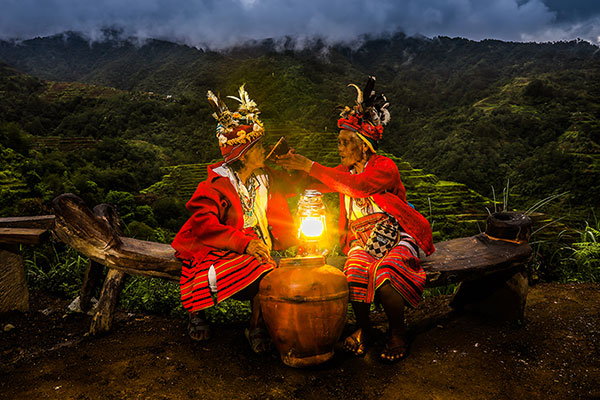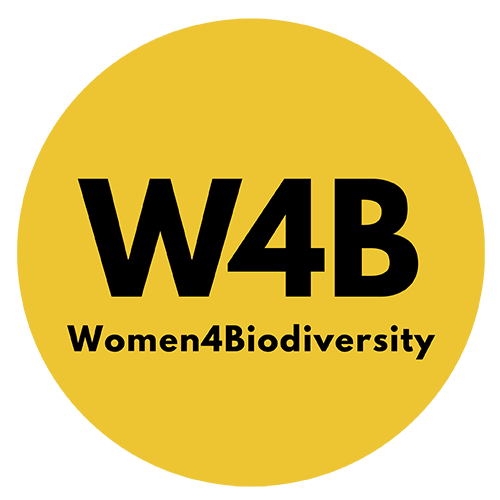From left to right: Alejandra Duarte (Women4Biodiversity), Mega Ayu Lestari (GYBN and ICCA Consortium), Marie Salvatrice Musabyeyezu (Go Green and Restore Africa Action), Lizbet Granados (CBD Women’s Caucus) and Cristina Romanelli (World Health Organization).
Traditional health systems, rooted in centuries of empirical knowledge, reveal the interdependence between ecosystems and human health. However, women’s ecological and health-related knowledge has often been marginalised and overlooked in scientific and policy spaces. Evidence shows that policies and monitoring are more effective when they integrate diverse knowledge systems, particularly those of Indigenous and local women, whose leadership connects ecological, cultural, and health dimensions. As primary providers of food, water, and medicine, rural and Indigenous women possess extensive expertise in resource management, medicinal plants, and community health, making their participation essential in biodiversity and health governance.
COP16 Decision 16/19 adopted the Global Action Plan on Biodiversity and Health, to promote holistic, cross-sectoral, and rights-based approaches aligned with the Kunming-Montreal Global Biodiversity Framework (KM-GBF). The decision highlights the importance of equity and inclusive participation in achieving co-benefits for all stakeholders, including people, animals, plants, and ecosystems. A gender-responsive implementation is crucial to address power imbalances and the persistent exclusion of women and Indigenous Peoples from data systems, monitoring, and policy processes.

The Action Plan provides a framework for operationalising this vision by calling on Parties to implement the Gender Plan of Action (2023–2030), raise awareness of the contributions of women, youth, and Indigenous and local communities, and ensure their meaningful participation in all stages of decision-making and implementation.
In this context, Women4Biodiversity (W4B) organised a press conference during the 27th Session of the CBD Subsidiary Body on Scientific, Technical and Technological Advice (SBSTTA 27), to promote progress in implementing the Global Action Plan on Biodiversity and Health, emphasising the integration of human rights-based and gender-responsive approaches. It also highlighted the roles of women, youth, Indigenous Peoples, local communities, and other vulnerable groups in biodiversity and health governance, while sharing lessons and strategies for inclusive and rights-based implementation.

Mega Ayu Lestari, Member of the Global Youth Biodiversity Network (GYBN), and Advocacy and Campaign Officer of Working Group ICCAs Indonesia, underscored the importance of embracing diverse knowledge systems and restoring harmony between people and nature. She described local knowledge functions as a living pharmacology textbook that offers effective remedies for broken bones, snake bites, and others, with women serving as key knowledge holders and healers. Mega stressed that addressing power imbalances and recognising community leadership are essential for transformative change, calling for stronger land tenure and security as foundations for environmental and community health.
Marie Salvatrice Musabyeyezu, Managing Director of Go Green and Restore Africa Action, emphasised that in many communities, particularly in mountain regions, women play a crucial role in ensuring food security, collecting water, and maintaining family well-being. Yet, they face disproportionate risks from pollution and ecosystem degradation. She called for women’s meaningful participation in monitoring, planning, and reporting, along with capacity-building that values traditional knowledge. She also underscored that actual progress requires transforming power relations to achieve gender equality and uphold human rights in biodiversity governance.
Lizbet Granados, representing the CBD Women’s Caucus, emphasised that the link between biodiversity and health must be addressed through a One Health approach that integrates gender, human rights, and social inclusion. She noted that women, girls, Indigenous Peoples and Local Communities experience the impacts of biodiversity loss and health crises in differentiated ways, calling for greater visibility of women-led initiatives that restore ecosystems and promote community health, as well as strengthen national capacities for gender analysis and human rights-based implementation.
Cristina Romanelli, Programme Officer, Biodiversity, Climate Change and Health from the World Health Organization (WHO), presented the new WHO framework on traditional knowledge, biodiversity, and health, developed under WHO’s Global Traditional Medicine Centre and aligned with the One Health approach. The framework aims to strengthen collaboration with the Convention on Biological Diversity for gender-responsive and rights-based implementation, linking community actions with global efforts, and supporting Indigenous leadership. Cristina emphasised that Indigenous Peoples are rights-holders, whose knowledge and leadership are vital to achieving the Global Action Plan on Biodiversity and Health.

The press conference underscored the pressing need to integrate gender equality, human rights, and traditional knowledge into the implementation of the Global Action Plan on Biodiversity and Health. Achieving this requires addressing structural inequalities, strengthening land tenure, and ensuring the full and effective participation of women and youth at all levels of decision-making. It is also essential to integrate traditional knowledge systems with scientific knowledge to develop policies, monitoring frameworks, and implementation processes that are holistic and yield effective results.


